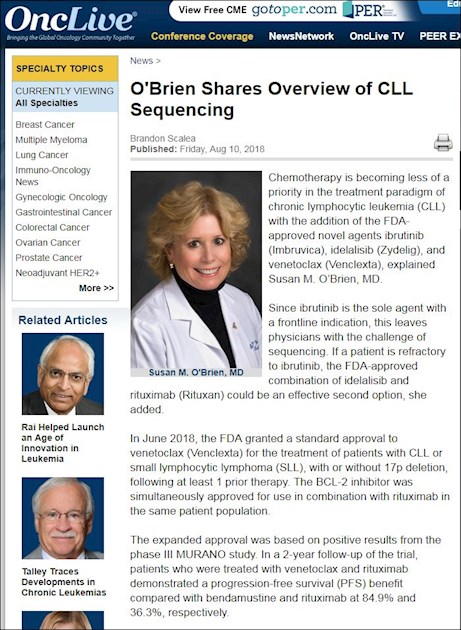O'Brien Shares Overview of CLL Sequencing
OncLive: by Brandon Scalea
Published: Friday, Aug 10, 2018
( poster comment; mostly a USA perspective)
onclive.com/web-exclusives/...
-
Susan M. O'Brien, MD
Chemotherapy is becoming less of a priority in the treatment paradigm of chronic lymphocytic leukemia (CLL) with the addition of the FDA-approved novel agents ibrutinib (Imbruvica), idelalisib (Zydelig), and venetoclax (Venclexta), explained Susan M. O’Brien, MD.
-
Since ibrutinib is the sole agent with a frontline indication, this leaves physicians with the challenge of sequencing. If a patient is refractory to ibrutinib, the FDA-approved combination of idelalisib and rituximab (Rituxan) could be an effective second option, she added.
-
In June 2018, the FDA granted a standard approval to venetoclax (Venclexta) for the treatment of patients with CLL or small lymphocytic lymphoma (SLL), with or without 17p deletion, following at least 1 prior therapy. The BCL-2 inhibitor was simultaneously approved for use in combination with rituximab in the same patient population.
-
The expanded approval was based on positive results from the phase III MURANO study. In a 2-year follow-up of the trial, patients who were treated with venetoclax and rituximab demonstrated a progression-free survival (PFS) benefit compared with bendamustine and rituximab at 84.9% and 36.3%, respectively.
-
The array of available treatment options means sequencing should be done on an individualized basis, said O’Brien, associate director for Clinical Sciences, Chao Family Comprehensive Cancer Center, University of California Irvine Medical Center.
-
For example, data have strongly indicated that patients with CLL who have a 17p deletion will not respond to chemotherapy. Chimeric antigen receptor (CAR) T-cell therapy could be an alternative for these patients in an early setting, O’Brien said.
-
In an interview with OncLive, O’Brien discussed some of the latest intriguing data in the treatment of CLL and what this means for physicians and patients.
-
OncLive: What are some of the latest advancements in CLL?
-
O’Brien: We have had 3 oral agents approved in the last 4 years, which is very exciting. All of them are nonchemotherapy options. We have ibrutinib, which is a BTK inhibitor, idelalisib, a Pl3K-delta inhibitor, and then, most recently, we have venetoclax, which is a BCL-2 inhibitor.
-
What is the optimal sequence of these agents?
-
In terms of sequencing the small molecule inhibitors, ibrutinib is actually the only one that has a frontline label right now. That tends to be one that's used first, not that everyone gets ibrutinib in the frontline setting. There is still use of chemotherapy out there. We base this on the mutation status and the 17p deletion status, because we don't want to use chemotherapy in patients with 17p. We know that chemotherapy simply does not work in patients with 17p.
-
In the setting of using frontline ibrutinib, if the patient is intolerant to ibrutinib, then we can easily switch over to idelalisib plus rituximab because these were FDA approved to be used in combination. We could also switch to venetoclax. However, in patients who are truly refractory to ibrutinib, there are data that suggest if you switch to idelalisib, you don't get much “bang for your buck.” There tends to be a response, but it's usually transient.
-
On the other hand, there was a recent publication that said if you use venetoclax when patients are resistant to ibrutinib, there are very good responses that tend to be durable. You even see minimal residual disease negativity. Venetoclax just had its label expanded based on the MURANO study, and that was the randomized trial of venetoclax and rituximab versus bendamustine and rituximab. That trial showed a clear advantage in PFS under the venetoclax arm. Therefore, now we have the option to do single-agent venetoclax or the combination with rituximab for 2 years.
-
What are some challenges in the sequencing of these agents?
-
Ibrutinib is the only one with a frontline indication. Venetoclax is in an ongoing clinical trial with obinutuzumab (Gazyva), the other novel anti-CD20 agent. That randomized trial will probably lead to a frontline label for venetoclax. This will allow us to have more options, which is good, but it also would make sequencing more complicated. When venetoclax and rituximab is approved [in the frontline setting], that might even become the preferable option.
-
Are there any novel agents on the horizon for CLL?
-
The only one that is close is duvelisib, which is a Pl3K-delta inhibitor. It was in a registration trial in relapsed CLL. It's in a similar trial that led to the full approval of ibrutinib. That drug clearly has a better PFS than the antibody, so my guess is that drug will likely be approved in the coming months. The toxicity profile is similar to idelalisib. There are also some interesting agents in phase I studies, but it's too early to mention those.
-
Is there potential for immunotherapy or cellular therapy in CLL?
-
CAR T-cell therapy has activity; we know that. Perhaps it hasn't looked as good in CLL as it has in lymphoma or acute lymphoblastic leukemia. Part of that is, with CAR T-cell therapy, you're taking the patient’s T cells and redirecting them to the leukemia. Patients with CLL tend to have exhausted T cells and they don't function normally. This is probably why we haven't seen such promising data. On the other hand, this T-cell exhaustion could have to do with the effects of chemotherapy. As we move away from so much chemotherapy, this could work itself out.
-
What is the takeaway message for community oncologists?
-
First off, we should be looking at 17p status any time we start therapy. This is a poor prognosis, and we don't want to give those people chemotherapy. We might consider something earlier, such as a CAR T-cell therapy. The second one is that mutation status is becoming very important.
